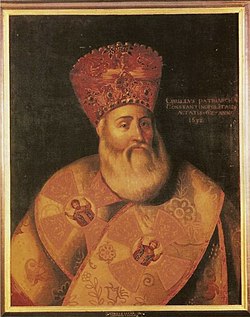Cyril Loukaris
| Cyril I Lucaris | |
|---|---|
| Ecumenical Patriarch of Constantinople | |
 |
|
| Church | Church of Constantinople |
| In office | October 1612 (locum tenens) 4 November 1620 – 12 April 1623 22 September 1623 – 4 October 1633 11 October 1633 – 25 February 1634 April 1634 – March 1635 March 1637 – 20 June 1638 |
| Personal details | |
| Born | 13 November 1572 Heraklion, Greece |
| Died | 27 June 1638 |
| Previous post | Greek Patriarch of Alexandria as Cyril III |
| Hieromartyr Cyril Lucaris | |
|---|---|
 |
|
| Ecumenical Patriarch of Constantinople; Pope and Patriarch of Alexandria; Hieromartyr | |
| Born | 13 November 1572 Candia, Crete |
| Died | 27 June 1638 Bosporus |
| Canonized | 6 October 2009, Patriarchal Church of Saint Savvas the Sanctified in Alexandria by Holy Synod of the Patriarchate of Alexandria |
| Major shrine | Monastery of Panagia Kamariotissa, Halki |
| Feast | 27 June |
| Attributes | Eastern episcopal vestments, holding a Gospel Book or a crosier. He is depicted as a big white beard. |
Hieromartyr Cyril Lucaris or Loukaris (Greek: Κύριλλος Λούκαρις, 13 November 1572 – 27 June 1638), born Constantine Lucaris, was a Greek prelate and theologian, and a native of Candia, Crete (then under the Republic of Venice). He later became the Greek Patriarch of Alexandria as Cyril III and Ecumenical Patriarch of Constantinople as Cyril I. Lucaris strove for a reform of the Eastern Orthodox Church along Protestant and Calvinist lines. Attempts to bring Calvinism into the Orthodox Church were rejected, and Cyril's actions and motivations remain a matter of debate among the Orthodox.
Cyril Lucaris was born in Candia, Crete on 13 November 1572, when the island was part of the Venetian Republic's maritime empire. In his youth he travelled through Europe, studying at Venice and the University of Padua, and at Geneva where he came under the influence of Calvinism and the Reformed faith. Lucaris pursued theological studies in Venice and Padua, Wittenberg and Geneva where he came under the influence of Calvinism and developed greater antipathy for Roman Catholicism.
While the exact date is unknown, Lucaris was ordained in Constantinople. In 1596 Lucaris was sent to Poland by Meletius Pegas, Patriarch of Alexandria, to lead the Orthodox opposition to the Union of Brest-Litovsk, which proposed a union of Kiev with Rome. For six years Lucaris served as professor of the Orthodox academy in Vilnius (now in Lithuania). In 1601, Lucaris was installed as the Patriarch of Alexandria at the age of twenty-nine. He would continue to hold this office for twenty years, until his elevation to the See of Constantinople. During these years, Lucaris adopted a theology which was heavily influenced by Protestant Reformation doctrine. On September 6, he wrote a letter to Mark Antonio de Dominis, a former Roman Catholic Archbishop, writing:
...
Wikipedia
